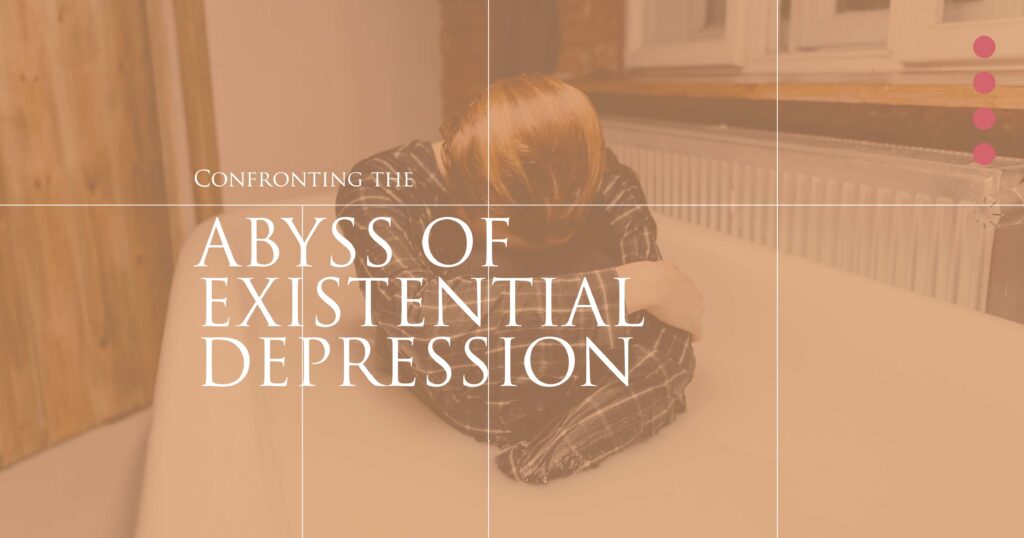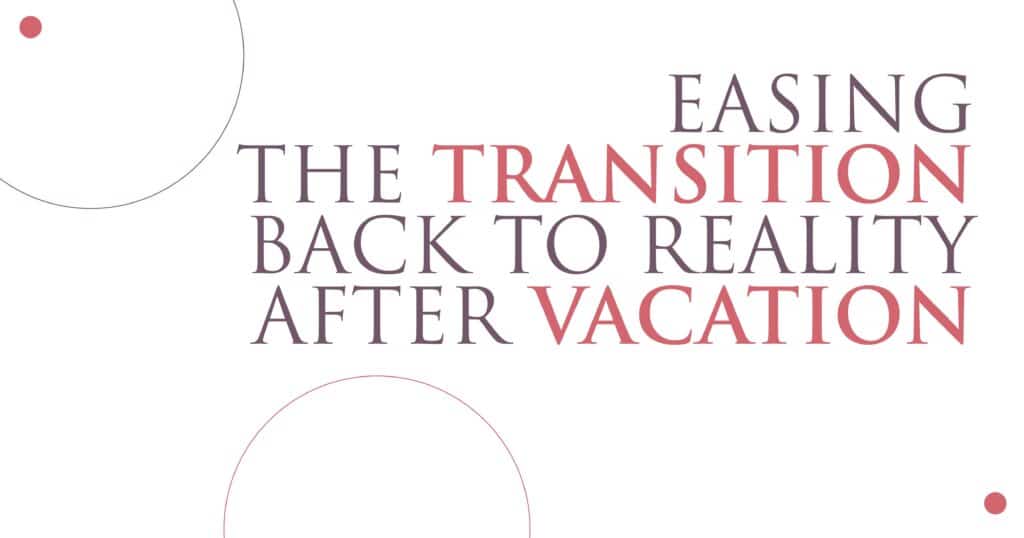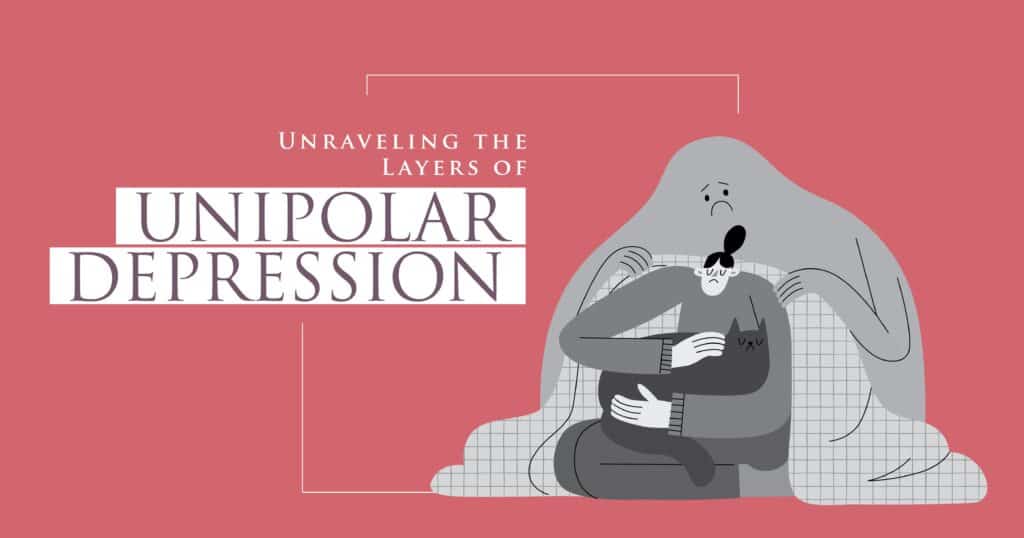There are moments in life when the world seems to lose its color – when the things that once brought joy now feel hollow, and the questions lurking beneath existence rise sharply to the forefront. “Why am I here?” “What’s the point of it all?” “Does anything I do truly matter?”
This isn’t just sadness or burnout. It’s something more profound – a heavy, disorienting state known as existential depression, where the very foundation of meaning and purpose feels shaken. It’s not about chemical imbalances or fleeting mood swings; it’s about grappling with the core of what it means to exist.
Defining Existential Depression
Existential depression is a profound psychological state that emerges from deep contemplation about life’s fundamental questions – the meaning of existence, the inevitability of death, the nature of purpose, and one’s place in the universe. It differs from other forms of depression because it isn’t primarily triggered by specific external events or biological factors. Instead, it arises from philosophical reflection and an acute awareness of existential realities.
While traditional depression might center on feelings of sadness, hopelessness, or low energy, existential depression is often rooted in existential anxiety – an inner turmoil born from questions that lack clear answers. It’s a crisis of meaning, where an individual becomes painfully aware of life’s transience and unpredictability.
This form of depression can manifest in anyone, but it often appears during major life transitions, periods of isolation, or times of profound personal reflection.

San Jose Mental Health
Signs and Symptoms of Existential Depression
Existential depression is complex, and its symptoms can be subtle or overwhelming. Because it’s deeply tied to one’s worldview and sense of purpose, it may not always look like typical depression. However, some of the most common signs include:
- Chronic questioning of meaning and purpose: Constantly pondering the meaning of life or one’s role in the universe.
- Emotional numbness or detachment: A sense that life lacks significance or depth.
- Loss of interest in previously meaningful activities: Hobbies, work, or relationships may feel trivial or pointless.
- Intense feelings of isolation: Believing that no one else truly understands these existential struggles.
- Heightened awareness of mortality: Frequent thoughts about death or the finite nature of life.
- Philosophical rumination: Obsessive thinking about topics like free will, morality, suffering, or the afterlife.
- Identity confusion: Struggling to define oneself or understand one’s place in the world.
Causes and Triggers of Existential Depression
The roots of existential depression lie in the very nature of human consciousness – our capacity for self-awareness, introspection, and philosophical thought. However, certain factors can trigger or intensify these feelings:
| Cause / Trigger | Impact |
| Life transitions | Major changes spark questions about meaning and identity. |
| Existential crises | Trauma or awareness of mortality leads to deep doubt and questioning. |
| Isolation | Lack of connection intensifies feelings of emptiness. |
| Societal pressure | A fast-paced, success-driven culture makes life feel meaningless. |
| Philosophical exploration | Deep thinking without support can trigger depressive spirals. |
Existential Depression in Gifted Individuals
Gifted and highly intelligent individuals are particularly prone to existential depression. Their heightened intellectual and emotional sensitivity often leads them to ponder life’s deeper questions earlier and more intensely than their peers.
Such individuals may experience:
- Acute awareness of injustice and suffering in the world.
- Frustration with superficiality and a longing for deeper meaning.
- Difficulty relating to others, leading to feelings of isolation.
- Early identity struggles occur as they attempt to reconcile their unique perspectives with societal expectations.
San Jose Mental Health
Therapeutic Approaches to Address Existential Depression
Treating existential depression requires more than standard talk therapy or medication. Because it’s rooted in philosophical questioning, therapeutic approaches must engage with those deeper concerns while helping individuals develop coping tools and perspectives.
Some of the most effective approaches include:
Existential Therapy
This therapeutic model directly addresses existential questions, helping individuals explore themes like freedom, responsibility, mortality, and meaning. The goal is not to eliminate these questions but to help clients live authentically despite uncertainty.
Logotherapy
Developed by Viktor Frankl, logotherapy is centered on the belief that humans are driven by a “will to meaning.” By helping individuals discover purpose – even in suffering – this approach offers a path out of despair.
Cognitive-Behavioral Therapy (CBT) with a Philosophical Lens
While traditional CBT focuses on restructuring negative thought patterns, integrating existential concepts can help individuals reframe their understanding of life’s inherent uncertainties.
Narrative Therapy
This approach helps individuals rewrite their personal stories, emphasizing agency, resilience, and the power to shape meaning in their lives.
The Role of Philosophy and Personal Beliefs
At the heart of existential depression lies the human search for meaning – and philosophy offers both a language and a framework for that search. Philosophers from Søren Kierkegaard to Albert Camus and Jean-Paul Sartre have grappled with questions of meaning, purpose, and absurdity.
For some, embracing existentialist thought – the idea that life has no inherent meaning and that we must create our own – can be liberating. For others, spiritual or religious beliefs provide grounding answers to life’s deepest questions.
Regardless of belief system, exploring philosophy can be deeply therapeutic. It allows individuals to situate their experiences within a broader context and offers tools for constructing a meaningful worldview.
Coping Strategies and Support Systems at San Jose Mental Health
Navigating existential depression is a deeply personal journey, but no one has to face it alone. At San Jose Mental Health, we offer comprehensive support tailored to the unique challenges of existential concerns. Our approach blends evidence-based therapies with compassionate, human-centered care.
Reach out to San Jose Mental Health and take the first step toward a healthier, more meaningful future. Together, we can transform the abyss of existential depression into a space for growth, understanding, and renewed purpose.

San Jose Mental Health
FAQs
What is existential anxiety, and how does it relate to philosophical depression?
Existential anxiety is the deep unease that arises from confronting life’s uncertainties, such as death, freedom, and purpose. When this anxiety becomes overwhelming, it can evolve into existential or philosophical depression, marked by despair and loss of meaning.
How can an existential crisis impact one’s personal identity and purpose of existence?
An existential crisis can shatter long-held beliefs, forcing individuals to reevaluate who they are and what they value. This introspection can lead to confusion and disorientation, but also opens the door to deeper self-understanding and a redefined sense of purpose.
What role does existential therapy play in helping individuals during their search for meaning?
Existential therapy helps individuals explore fundamental life questions and embrace uncertainty. It empowers them to create their own meaning and live authentically, even when definitive answers remain elusive.
How do philosophical beliefs influence the way we perceive the meaning of life during an existential crisis?
Philosophical beliefs act as a lens through which we interpret life’s challenges. Whether rooted in existentialism, spirituality, or humanism, these frameworks shape how we find meaning and guide our responses to life’s uncertainties.
What are some effective coping strategies for managing existential depression and maintaining a sense of purpose?
Engaging in meaningful activities, fostering deep relationships, practicing self-compassion, and exploring philosophical or spiritual perspectives can all help. Therapy and guided reflection can further support individuals in building a purposeful life despite existential uncertainty.







